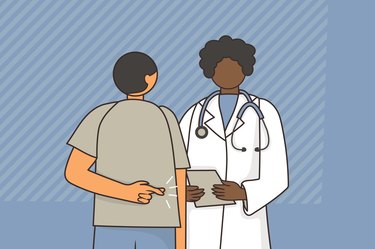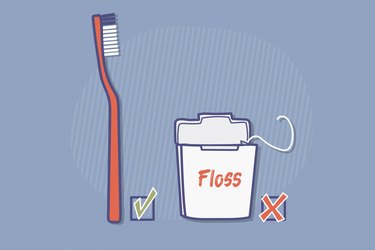
You're an upstanding and honest person, of course. Dig down deep, though, and you may recall that you've occasionally found yourself embellishing the truth or strategically omitting information at a doctor's visit.
Maybe you've upped how much you exercise, downgraded the number of alcohol you drink or claimed greater diligence with your meds than is strictly true.
Video of the Day
Video of the Day
With these kinds of fibs, you're far from alone. Based on his experience, "It happens quite often," Eric Michael Ascher, DO, a family medicine physician at Lenox Hill Hospital in New York, tells LIVESTRONG.com.
Research backs this up.
Two national online surveys in November 2018 revealed it was common for people to deliberately hold back information from health care providers — such as whether they disagreed with the doctor's assessment, avoided exercise or hadn't taken medications as prescribed. For one survey, 81 percent of participants withheld information, while in the other, 61 percent held back, per the investigation in JAMA Network Open.
That's a majority of people who are visiting their doctors to maintain or improve their health, and not being fully forthcoming.
"In my clinical practice, it is hard to say if I've had as high a percentage [of fibs], but certainly, there have been patients who either told white lies or were very reluctant to share some information about their health," says Rod Tanchanco, MD, FACP, and author of the book First Patients.
So what's happening here? We spoke to doctors to try to untangle why people are so prone to white lies while gowned up — and what the potential consequences are.
What Motivates People to Lie at the Doctor?
There are, it turns out, many different reasons why people are less than honest with their doctor. Here's a few:
- You're embarrassed. "They may be embarrassed about the nature of their condition," says David Cutler, MD, family medicine physician at Providence Saint John's Health Center in Santa Monica, California. Or, maybe they failed to follow a doctor's recommendations but don't want to admit it. "They may be embarrassed to admit that the instructions were not clear so they would just say everything is good," Dr. Tanchanco says.
- You don't want to be judged. People may sometimes be avoiding a lecture. "Perhaps they did not take their medications as instructed, gained weight or for some reason failed to follow medical advice. Those are hard to admit," Dr. Tanchanco says. People can also be reluctant to be transparent about certain sexual activity or substance abuse.
- You'd rather not know. Maybe you had unprotected sex. Or you're rarely active, or don't follow a healthy diet. In the JAMA surveys, not wanting to hear about the health harms of behavior was a top reason for not sharing information with doctors.
- You have a theory. Even before you're face-to-face with a doctor, you may have spent time — and lots of it — living with your symptoms, considering them and researching possibilities. This can lead to you having a sense of what's happening and why — and frame your conversation with a doctor to support that theory, Dr. Cutler says. "Facts which may seem inconsistent with their understanding may be excluded or altered. And irrelevant facts which seem important to the patient may get undue attention," Dr. Cutler says.
- You're a bit confused. Did you feel that pain first on Monday, or was it Sunday? Which came first: the rash or the fever? When you're not feeling well, recalling details can be tricky. It's less that you're fibbing to the doctor in this case, and more that you "may be confused about the timing, circumstances or significance of [your] experience leading up to a medical encounter," Dr. Cutler points out.
- You don't want to be a squeaky wheel. The November 2018 JAMA investigation into fibs found patients often held off on sharing information out of a desire to not be seen as a difficult patient or take up too much of the health care provider's time.
Common areas where people fib include how they acquired sexually transmitted diseases, substance usage and their adherence to diet or medical regimens, Dr. Cutler says.
"During the pandemic we have seen people be untruthful about having had COVID-19 vaccines, remaining quarantined after COVID-19 exposure or adhering to masking mandates," he says.
But often, untruths are less direct.
People share information incompletely or incorrectly, Dr. Cutler says — understandable enough, if you consider that most patients aren't doctors, accustomed to detailing symptoms with precision.
"In the highly stressful environment of a medical encounter it is totally understandable that all the information provided by the patient may not be 100 percent true," Dr. Cutler says.
And sometimes, a lie can just seem expedient. Over at the American Association of Medical Colleges, one of the JAMA researchers wrote about almost not sharing that she'd drank wine the night prior to surgery because she "dreaded trying to reschedule." (She did, ultimately, 'fess up.)
Who Fibs Most?
Based on the results in the JAMA surveys, there were three categories of respondents most likely to withhold information (note that the following is language used by the researchers):
- Women
- People who were young
- People in poor health (based on having a chronic condition or self-reporting poor health)
Caveats are in order. For instance, it’s worth noting that these results come from just two surveys, using only online samples, performed prior to the pandemic. And, as the researchers note, most participants were white.
2 Possible Effects of Lying to Your Doctor
While fibbing at the doctor's office is understandable, it's not without consequences.
1. You’ll Get Poor Medical Treatment
"The undesired consequence would be that care would be compromised," Dr. Tanchanco says.
Take for instance if you claim you're diligently taking a daily medication — but aren't actually doing so. This could happen for many reasons, Dr. Tanchanco notes, including being unable to afford the pills. But to your doctor, it'll look like the original medication isn't effective.
"The patient's condition worsens and the doctor orders more medications, more tests, not knowing that the patient is actually not adhering to the treatment plan," Dr. Tanchanco says. Not only is this bad for your health, but it can be expensive, he says — and it can also eat up time.
That's just one example of how things go wrong. If you don't share a symptom — perhaps out of anxiety about what it might mean — you won't get treated, Dr. Tanchanco points out.
And instead of opening a conversation, fibs close it. When people aren't fully honest it doesn't "allow me to counsel them for healthier lifestyles," Dr. Ascher says. And it also could lead to missed screenings, he points out — for STDs or cancer and heart disease exams.
2. You Could Have Medication Problems
"Patients should never lie about which medications they're taking," Dr. Tanchanco says. "This includes prescribed medications as well as lying about or not admitting to taking other substances that may be doing harm," he says.
Alcohol use can also interfere with medications, Dr. Ascher says.
And don't hold off on sharing vitamins and supplements, which also interact with certain medications and treatments.
Can a Doctor Tell if You’re Lying?
Your attempts to disguise the truth may not be fooling anyone.
Signs of fibs could include a lack of eye contact, changed body language, looking away or a general hesitation to respond, Dr. Ascher says.
When that happens with patients, Dr. Ascher sometimes tries framing his queries differently. For instance, if he’s inquiring about drinking habits, he might provide a range to choose from — rather than requesting a number.
“If there is some clue that the patient is being untruthful, figuring out the underlying reasons would help,” Dr. Tanchanco says.
If it’s embarrassment or fear of being judged holding you back from full-throated honesty, take heart: Sometimes patients open up toward the end of a visit, Dr. Ascher says. They’ll say things like “I wasn’t going to say this” or “I’ve never told anyone this before,” he says.
But from his perspective as a trained provider, the details patients share are rarely shocking. “We’re not going to be uncomfortable because of those things [that patients share],” he says.
If You Find Yourself Fibbing, Consider Getting a New Doctor
Talking about your health can be uncomfortable. Who wants to describe an unusual scent to their vaginal discharge, dig into a partner's infidelity or share intimate emotional details with a health care professional you may see only once a year (if that)?
These things feel private, and maybe a bit awkward, too. Describing your family health history can feel weighty and sad.
But the best and most effective relationships with a doctor occur when you can feel comfortable being honest.
"Selecting a physician with whom you feel comfortable sharing personal information is critical to getting the best care," Dr. Cutler says. "In the end, the quality of the medical care you receive may largely depend on the quality of the information you provide to your physician," he says.
If you don't feel comfortable being open with your doctor, you may have good reason. Some doctors rely on jargon, give constant lectures or are in a big rush, Dr. Tanchanco says. That's not a good environment for confiding.
Try these tips to find a doctor who is a good fit, Dr. Cutler suggests:
- Get recommendations: Ask friends, family and colleagues for recommendations.
- Read reviews: These can be helpful, Dr. Cutler says.
- Take a look at credentials: "Carefully reviewing a physician's credentials regarding their background, education and practice experience can help you choose one who seems right for you," Dr. Cutler says.
It's not that you'll get in trouble for lying to your doctor (and no, lying to a doctor isn't illegal). But you won't get good care. Most doctors — including the ones interviewed for this article — are eager for patients to feel like partners.
"I always remind my patients that I'm not here to judge, I'm not here to lecture. I'm here to create a partnering relationship with them, so we can foster better quality of life," Dr. Ascher says. "I want to help them on their successful health care journey."
So, How Bad Is It Really to Fib to Your Doctor?
"It definitely depends on what they're fibbing about," Dr. Ascher says.
Rounding up how often you exercise, not mentioning a missed dose of a medication or knocking one drink off your weekly total may not be a very big deal.
But some fibs can lead to health repercussions. Doctors may prescribe treatments that are ineffective or harmful — or, important screening labs and exams might not be ordered. Diagnoses can be missed.
And frequent fibs are a big indicator that you're not seeing the right health care provider. "If you feel as though you can't be 100 percent honest with your doctor 100 percent of the time, you need to find a new doctor," Dr. Ascher says.
You shouldn't feel judged or lectured, he says.
"Most good doctors are really smart," Dr. Ascher says. "But what makes a great doctor is the ability for a patient to feel comfortable and feel honest with them."
Is this an emergency? If you are experiencing serious medical symptoms, please see the National Library of Medicine’s list of signs you need emergency medical attention or call 911.



